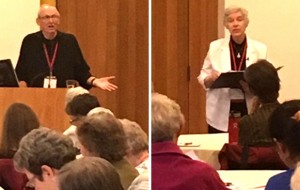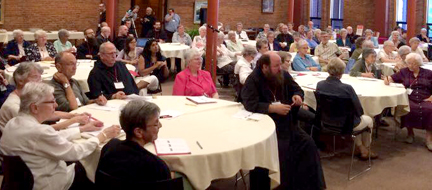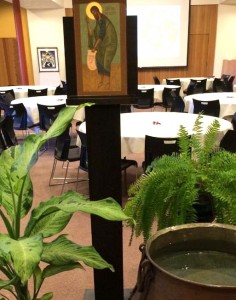Openness to change is a cornerstone of Benedictine life, reflected in the vow of conversatio morum, traditionally understood as “conversion to the monastic way.” Conversatio points Benedictines to an openness of the heart, a commitment to conversion—a deep-seated orientation toward the Spirit’s call. At its best, Benedictine life is a fluid and flexible form, inspired by a 1500-year history and the examples of those who have gone before.
Last week over 100 monks, sisters, nuns, oblates and students of theology attended the 2016 Monastic Institute hosted by Saint John’s School of Theology and Seminary in Collegeville, MN. Reflecting on the theme of Benedictine monastic profession in our time, Abbot John Klassen of Saint John’s Abbey and Prioress Michaela Hedican of Saint Benedict’s Monastery, offered rich wisdom and scholarship on the three central promises of Benedictine life: stability, obedience and conversatio morum.
As our conversations deepened, I slowly came to know the people and stories in the room. Among those gathered were monks and oblates, Roman Catholics, Lutherans and Episcopalians, missionary and contemplative Benedictines, cloistered and active, habited and not-habited, old and young, Vietnamese, Filipino, Hispanic. As a newcomer myself, it was deeply encouraging to see and hear the ways that Benedictine life provided for and even encouraged differences.
As the Institute drew to a close, the fatal shootings of Alton Sterling in Baton Rouge and Philando Castile in Minneapolis dominated the news. The cry for justice, for the violence and bloodshed to cease and for every person—no matter their color—to feel safe and respected in this country, rang out from protestors and permeated our prayers. The wound of racism is not just a matter for the world; it is a matter for the monastery and for every praying community. We are not immune; we too need healing.
As a woman of color, an Indian-American raised by immigrant parents, and a newly professed sister, the events of these recent days begs a question: What does my monastic profession call me to in this time, in this place? I wish I had an easy answer.
What I have come to see is:
- My promise of stability binds me to relationships in a country convulsed by pain, divided by the sin of racism.
- My promise of obedience calls me to listen unwaveringly, to respond to violence with my own cry for healing and help.
- My promise of conversatio morum invites me to change, openness, faith—even in the face of systemic racism.
This is not easy. But I find hope in the ways my own ecumenical Benedictine community has responded to diversity. By welcoming the Spirit in one another, we commit ourselves to finding ways to grow daily into a diverse human family. It is often painful personal work, but it is what I believe my monastic profession demands of me today, in this time and in this place.
(photos from Saint John’s School of Theology and Seminary)
________________________
Read other blog posts from Sister Rosy in her series, Letters home.






Comments 4
Well said Rosy. Remaining open to change —- and change and change and change. To listen to the cacophony of voices and to remain rooted and committed to the relationships that surround you…wow, that’s a recipe for all our lives. Thanks for helping me heal by lifting your voice here.
Thanks, Christine. Glad you found some healing here, and I’d be eager to hear more about how you’re processing these events yourself. Hope to see you soon and share in conversation.
Thanks Rosie! Reading this, I am reminded of the words of a former abbot at the Abbey of Gethsemani in Kentucky. When asked why did he leave the world of activism to enter a monastery, he said the monastery for him represented “a place of 10 good men praying for the condition of the world. ” In these times and all times, we need 10 good men/women praying for the world! Glad to see you and Paz added to the strong foundation of Mary David, JoAnne, Lynne!
Love, peace, and prayer
Thanks, Joe. 10 good praying women sure would be a nice round number for us! 🙂